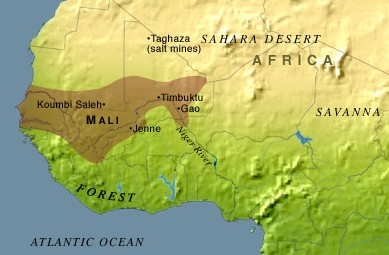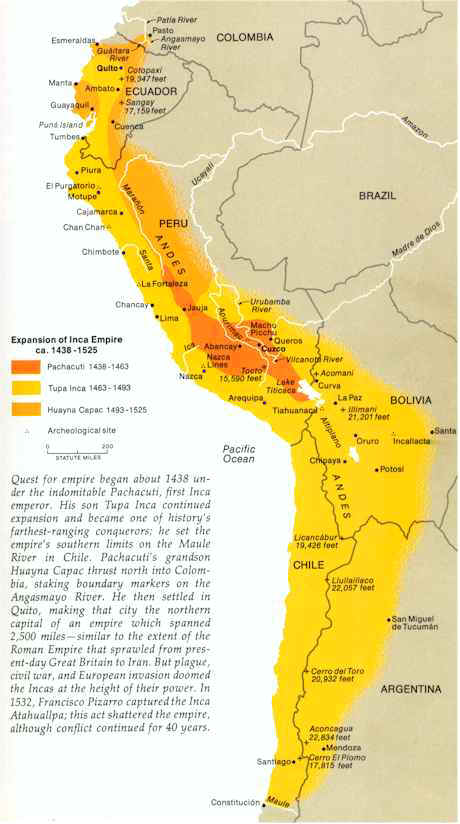I have been reading about the Roman Empire and I recently saw a television program comparing the Mongol, Mali and Inca Empires. Of course, by the standards of those Empires the United States is also an empire with more than 300 million people spread over 50 states.
The program comparing the three empires of course dealt with the ways in which a central tribe was able to rule a large area (ability to communicate over distance, rapid military movements, ability to support military forces in the field). It did not focus on the huge differences among those three empires. The Mongols lived on the steppes of Central Asia while the Incas lived in the Andes. The Mongols were a horse culture while the Incas had no large beasts of burden. The Mongols were pastoralists while the Incas were farmers. The Mongols were literate while the Incas depended on the Quipu for communicating information.
I think we may tend to compare empires, and indeed to spend a lot of time studying empires, because we attach positive value to the simple fact that they are political entities that include large numbers of people disbursed over large geographical areas. That may well be an implicit value of our culture, absorbed rather than learned, but non the less influential in our attitudes and conduct.
I wonder, however, whether groups without imperial pretensions might often be more worthy of our attention and respect. Think of the heroism of some of the American Indians over the past few centuries as they sought ways to live and survive the onslaught of Yankee expansion. There is much to admire in their independence, in the ways of living with nature, in their communalism. Think of Sequoia inventing his own system of writing and the intellectual achievements of his Cherokee tribe.
How do we avoid ethnocentrism, avoid assuming that the values we share within our own culture are the most admirable values to be sought in all cultures? Are there things we can agree among cultures that are important values?
I suppose people agree that it is better to be healthy than sick, better to be well nourished than badly nourished, better to be fit and strong than unfit and weak, better to be bright and alert than to be dull and lethargic. Clearly cultures blessed by richer environments and better technology find it easier for their members to achieve the desired states; however, there are clearly cultural values that contribute to success in these ways.
It seems that there has been a global decrease in the rate of violent deaths from crime and conflict over time. The decrease seems to be related to the changes in culture that accompany the social and economic development complex -- longer and healthier lives, greater economic affluence, more education, greater political participation, etc. While there still seem to be many who would easily go to war or become criminals, perhaps the majority of mankind who prefer peace and security can impose those values still more widely.
Surely for the foreseeable future there will be cultural values that will divide cultures, but at least in some areas there may be cultural values that encourage development in the sense of helping people in a culture to achieve lives less burdened by sickness, malnutrition and other conditions that all would agree are undesired.
 |
| Mongol Empire circa 1300 |
 |
| Mali Empire circa 1200 |
I think we may tend to compare empires, and indeed to spend a lot of time studying empires, because we attach positive value to the simple fact that they are political entities that include large numbers of people disbursed over large geographical areas. That may well be an implicit value of our culture, absorbed rather than learned, but non the less influential in our attitudes and conduct.
 |
| Inca Empire circa 1500 |
I wonder, however, whether groups without imperial pretensions might often be more worthy of our attention and respect. Think of the heroism of some of the American Indians over the past few centuries as they sought ways to live and survive the onslaught of Yankee expansion. There is much to admire in their independence, in the ways of living with nature, in their communalism. Think of Sequoia inventing his own system of writing and the intellectual achievements of his Cherokee tribe.
How do we avoid ethnocentrism, avoid assuming that the values we share within our own culture are the most admirable values to be sought in all cultures? Are there things we can agree among cultures that are important values?
I suppose people agree that it is better to be healthy than sick, better to be well nourished than badly nourished, better to be fit and strong than unfit and weak, better to be bright and alert than to be dull and lethargic. Clearly cultures blessed by richer environments and better technology find it easier for their members to achieve the desired states; however, there are clearly cultural values that contribute to success in these ways.
It seems that there has been a global decrease in the rate of violent deaths from crime and conflict over time. The decrease seems to be related to the changes in culture that accompany the social and economic development complex -- longer and healthier lives, greater economic affluence, more education, greater political participation, etc. While there still seem to be many who would easily go to war or become criminals, perhaps the majority of mankind who prefer peace and security can impose those values still more widely.
Surely for the foreseeable future there will be cultural values that will divide cultures, but at least in some areas there may be cultural values that encourage development in the sense of helping people in a culture to achieve lives less burdened by sickness, malnutrition and other conditions that all would agree are undesired.
No comments:
Post a Comment